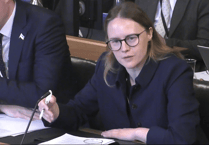ONE of the good things about being an MP is that I get to shout about Cornwall, telling people how fortunate we are, and making sure everyone knows about all the opportunities there are to invest and grow here. Even if we are at the very edge of Britain, a massive part of my job when I'm out and about is to make sure that Cornwall is present in every investors' mind.
Last week, I went to the UKREiiF conference in Leeds to do just that. UKREiiF is all about getting investment into public infrastructure like housing, renewables and key industries. I always speak at these events when possible to offer my support for Team Cornwall, the economic growth team from Cornwall Council and the people in the picture who are involved in getting these infrastructure projects off the ground back home in the Duchy.
One of the panels I was involved with was about the UK’s new public energy company, GB Energy. In less than a year Ed Miliband's vision for Britain as a clean energy superpower is starting to take hold. GB Energy is already putting solar panels on Falmouth Hospital and there will be renewable energy fitted on public buildings like Lys Kernow and the university soon as well.
Cornwall will also benefit from the Government’s plans to require energy developers to pay into funds or share ownership of local projects, in news announced last week. This is a move that will end the current situation where community benefits are optional, which resulted in many local communities missing out, or meagre payments that barely touched the sides. From now on, if you live near wind or solar your community should feel the benefit. Clean energy developers will be required by law to pay into a community fund, channelled into projects that can have a real impact, with local families in the area deciding where the money should be spent. The potential is really exciting, with projects that could be funded through the scheme including: community centres, energy efficiency programmes, education bursaries and apprenticeships, grants to small businesses, arts projects, and sports and recreation facilities.
The level of payments to communities will range depending on the size of infrastructure projects, from tens of thousands of pounds a year for small developments and up to millions of pounds per year for large-scale developments, like offshore wind power. Something that I am campaigning for in the Celtic Sea. And this comes after announced plans in the Planning and Infrastructure Bill to provide bill discounts of £250 a year for communities living near new electricity transmission infrastructure.
Labour's mission for Britain to become a clean energy superpower will need a mix of wind energy, geothermal, solar, tidal and some nuclear. The aim is to marry revitalising our coastal and rural communities, with providing energy security for the entire nation. It's a strong vision. Country and community. A win-win.


.jpeg?width=209&height=140&crop=209:145,smart&quality=75)


Comments
This article has no comments yet. Be the first to leave a comment.